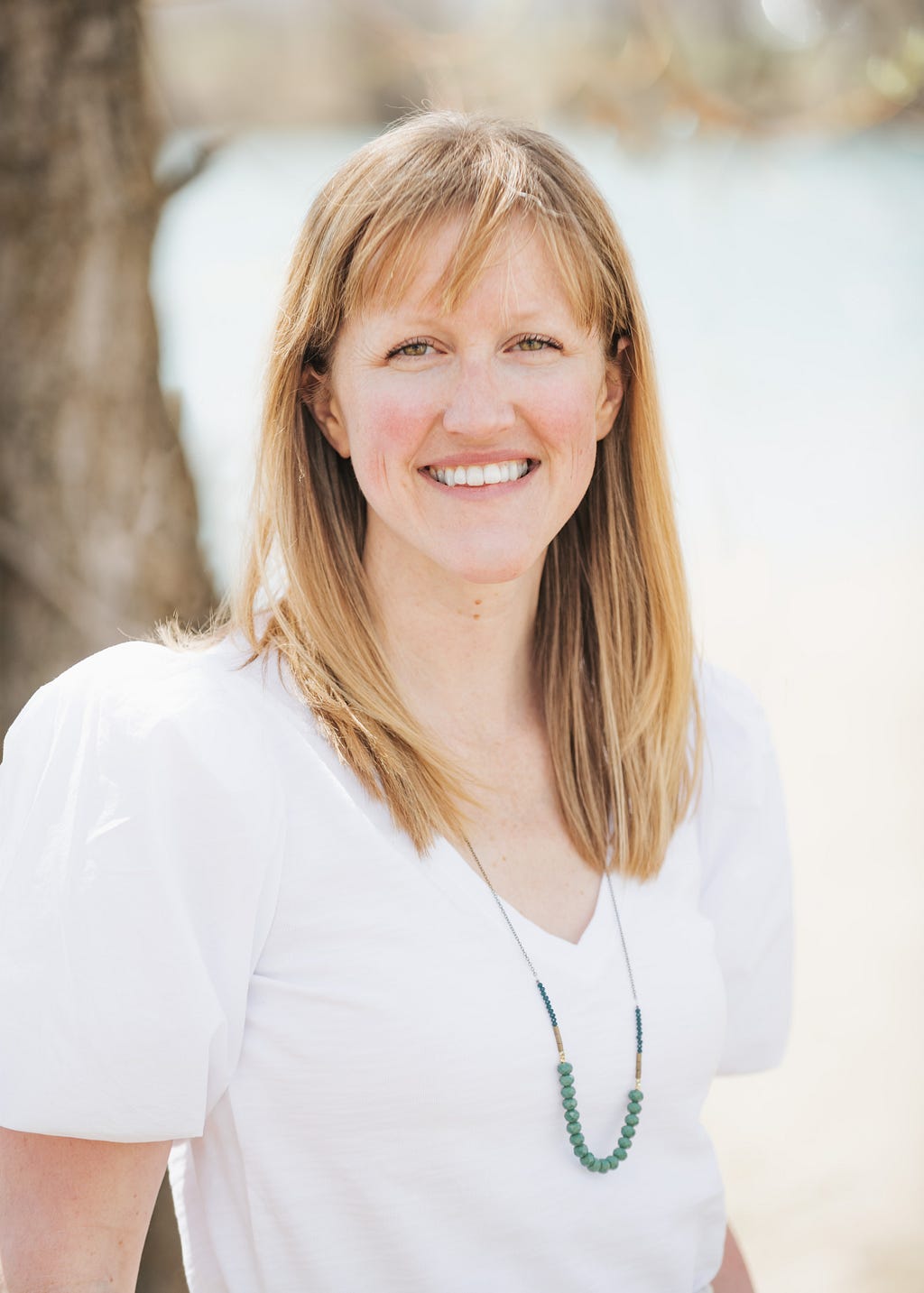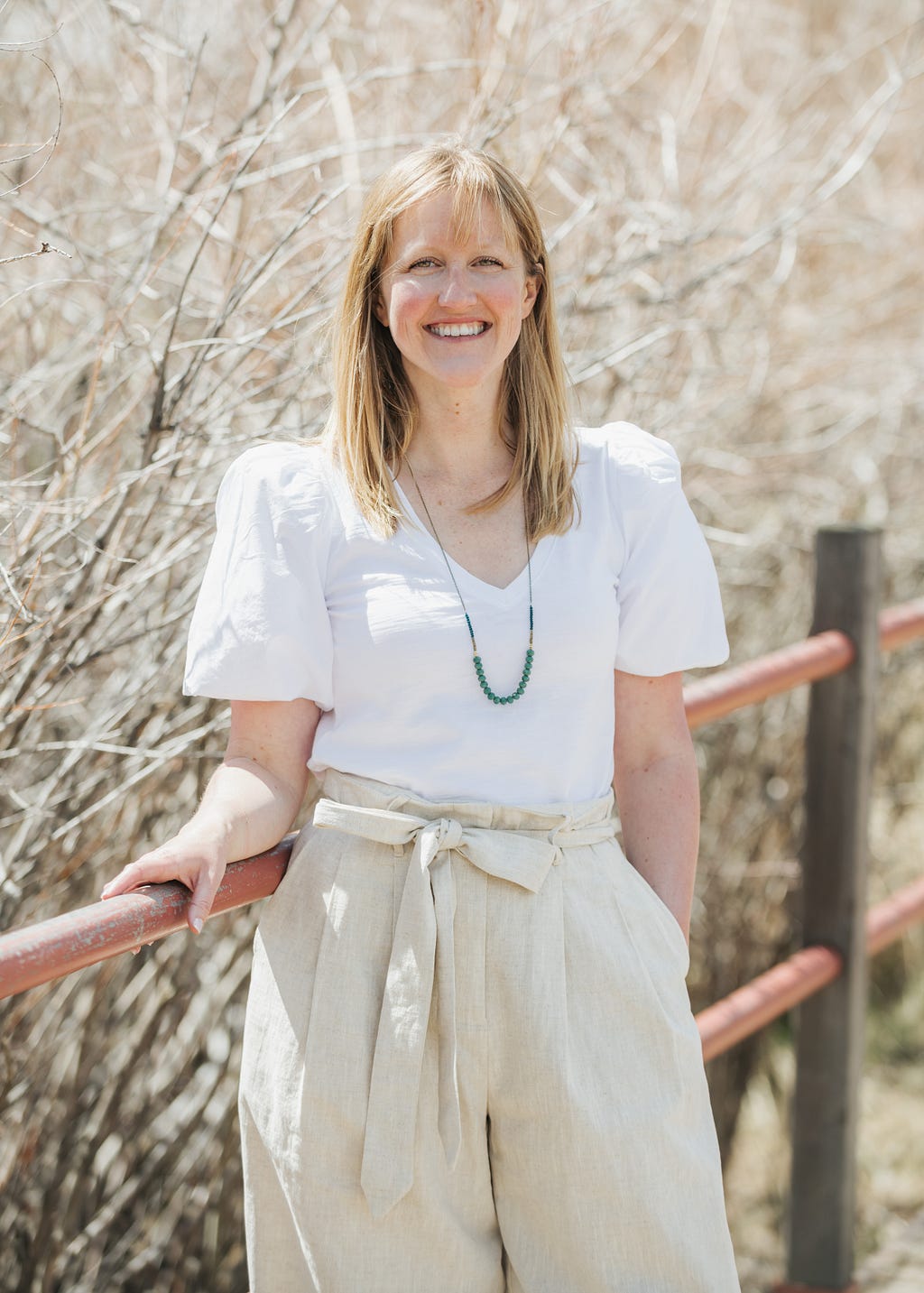
Be direct. As women, we’re often taught to tiptoe around asking for what we need or giving feedback, but if we are going to help our teams grow, we need to be clear and direct.
As part of my series about “individuals and organizations making an important social impact”, I had the pleasure of interviewing Erica Aytes Coyle.
Erica Aytes Coyle has worked in the field of intimate-partner violence intervention and prevention for over a decade and has served as Executive Director of Haven in Bozeman, Montana, since 2014. Under Erica’s leadership and in partnership with the larger Haven team, Haven’s staff size has tripled, the number of programs offered has doubled, and the organization is one of 16 in the United States that have scrapped the traditional salary structure in favor of using a structure that highlights areas of responsibilities — ensuring that front-line staff who work directly with domestic violence survivors are fairly and properly compensated. In addition to her work at Haven, Erica loves spending time with her husband and their two children, traveling, and exploring Montana in their camper.
Thank you so much for joining us in this interview series! Can you tell us a story about what brought you to this specific career path?
I remember sitting at one of the first staff meetings I attended at Haven and listening to the advocates talk about the cases they were supporting. All of a sudden, things started to click for me. I had thought of domestic violence as something that hadn’t affected me personally; in listening to the advocates’ stories, memories of friends’ stories of assault or violent home lives came rushing back to me. The pieces assembled themselves in my mind within seconds and I did a 180–even though I had never been in a violent relationship, relationship violence had absolutely impacted my life.
As my experience grew and my eyes were opened to the systemic injustices in the world, I realized that while I couldn’t fix systemic, big-picture problems, what I could do is start the change at home — at Haven. That means living into our values in clear and intentional ways every day. One of those values is equity, and the most significant way we’ve lived into our values is through creating a system for equitable compensation for our staff.
Can you share the most interesting story that happened to you since you began leading your company or organization?
As Haven was going down the path of creating equitable compensation for our staff, I had someone tell me, “Oh, so you want to dismantle the house the master built, while still keeping a roof over your head.” Bingo. What we needed was a system to do just that, and finding the consultants we worked with — Vega Mala Consulting — and learning that they had a system for that was transformative.
It has been said that our mistakes can be our greatest teachers. Can you share a story about the funniest mistake you made when you were first starting? Can you tell us what lesson you learned from that?
Early in my career, I wasn’t great at what we now call “reading the room.” I was working on getting my Master’s in Public Administration and as a result was entrenched in APA style. When the director of the organization saw a fundraising piece I’d drafted, she called me into her office and asked me to change all of the capitalization in the headlines to be in accordance with her preferred style guide, rather than APA.
Instead of apologizing, shrugging my shoulders, and using her style guide, I took it upon myself to “educate” her. Ouch! In retrospect the complete lack of awareness of office hierarchy definitely did not serve me well in that moment! And yet, it actually helped me see two things about myself: 1. Don’t try to work a highly demanding job while going to graduate school full-time (or really taking on too much in any aspect of my life). It’s a recipe for brewing defensiveness and burnout. 2. That I wanted to work for a leader that would welcome feedback and listen to differing points of view, even with something as minor as formatting, even for things as small as style guides. Since taking on more leadership roles, I have worked to create a culture in which everyone is able to provide input and feedback to all of their colleagues, no matter what the hierarchy might be.
This culture was massively helpful in creating equitable compensation at Haven. If the staff at Haven had not flagged the morale problems that compensation differences were causing, I never would have known that we had a problem. As part of the process, a task force made up of staff at all levels of the organization participated in writing our compensation philosophy, which was the foundation for the calculator itself. This was crucial in creating equitable compensation at Haven because if the staff had never flagged it for me, I never would have realized we had this opportunity to create this change.
Can you describe how you or your organization is making a significant social impact?
Haven’s impact is twofold: We’re not only serving more and more domestic violence survivors each year and educating more and more young people and community members about healthy relationships, but we’re also living into our values via the lens of pay equity.
If our staff on the front lines — the ones who work directly with domestic violence survivors — aren’t getting compensated properly, our organization is perpetuating the same inequities we work against every day. Haven is one of 16 organizations nationwide that have scrapped the traditional salary structure in favor of using a structure that highlights areas of responsibility. We’re compensating for vicarious trauma and emotional labor, which is something that people don’t often get compensated for. And no one has had to take a pay cut.
Can you tell us a story about a particular individual who was impacted or helped by your cause?
We like to find those big stories, the ones we can hold up as the ideal outcome. But at Haven, we don’t believe that our version of the best outcome is necessarily the best outcome for the survivor. The successes that come to mind for me are the ones that might look small from the outside but took heroic efforts on the part of the survivor.
There was the time that a mom and her child, who’d come to us too scared to leave the shelter for groceries or appointments, were able to feel safe enough to go on walks together on the trails near our shelter.
There was the woman who stood in court and argued her case for full child custody and won.
There was the survivor who became a volunteer with us and began publicly sharing her story.
It’s these details that stay with me and keep me in this field.
Are there three things the community/society/politicians can do to help you address the root of the problem you are trying to solve?
1. Society and our communities as a whole have enormous power in creating equitable pay structures. We may not be able to solve systemic inequities, but we can push back by creating pay equity within our organizations.
2. Our communities and larger society can also shift the dynamics of power and control around how we talk — or don’t talk — about domestic violence. Talking about an issue shows those who have experienced it that the community is willing to shine a light on the root causes and support those most affected. We like to say that domestic violence thrives in silence, and I can’t tell you how true this is. National statistics tell us that one in five people will experience relationship violence at some point in their lifetime, but since I have started working at Haven, that number seems to be a conservative estimate. Since I spend so much of my time out in the community talking about domestic violence, the number of acquaintances I have had disclose their own story far exceeds one in five.
3. The link between gun violence and domestic violence is undeniable. Politicians must enact meaningful gun control legislation — closing the boyfriend loophole permanently (not just for five years), banning assault rifles, and enacting universal background checks for all gun purchases.
How do you define “Leadership”? Can you explain what you mean or give an example?
Lean into the hard conversations, the ones that make you squirm and pull your hair out a bit. The ones that make you want to say, “Well, it’s not like we’re doing any worse than anyone else.” Haven very easily could have made a few salary adjustments instead of spending months building a new way of setting compensation. And if we had, we would have lost the opportunity to live into our values and demonstrate a true commitment to our staff.

What are your “5 things I wish someone told me when I first started” and why. Please share a story or example for each.
- Listen. In my early career, I thought that being a leader meant having all the answers rather than listening to the questions and hearing what was under those questions.
- Be direct. As women, we’re often taught to tiptoe around asking for what we need or giving feedback, but if we are going to help our teams grow, we need to be clear and direct.
- Just because something is the status quo doesn’t mean it should be accepted. In my day-to-day work, if I accepted the status quo then Haven would not be creating any real, impactful change.
- Build a network you can trust. I have a small handful of friends both in and out of the nonprofit world who provide perspective, experience, and are generous with sharing their ideas.
- It’s not a competition. The most successful organizations and leaders I’ve seen do not hold resources back. Instead, they share with their counterparts and try to lift all boats.
You are a person of enormous influence. If you could inspire a movement that would bring the most amount of good to the most amount of people, what would that be? You never know what your idea can trigger. 🙂
Inequities in our world are the root causes of so many problems we’re trying to address in the nonprofit sector, and there are plenty of inspiring leaders working against all of those inequities at the moment!
Can you please give us your favorite “Life Lesson Quote”? Can you share how that was relevant to you in your life?
“You cannot get through a single day without having an impact on the world around you. What you do makes a difference, and you have to decide what kind of difference you want to make.” — Jane Goodall.
Each day we have an opportunity to ask ourselves, are we going to show up? That can be showing up for any cause that’s important to us. For me, it’s about creating a world with more equity, whether it’s gender equity or pay equity.
Apathy is a choice too. We can make the choice to ignore those systemic inequities and let them reign, or we can make the choice to dismantle them.
Is there a person in the world, or in the US with whom you would like to have a private breakfast or lunch with, and why? He or she might just see this, especially if we tag them. 🙂
Is it too predictable to say Brene Brown? But in all honesty, the work she has done to help our society be comfortable with emotions has had a massive impact on how we can all be in relationship with one another. Through our compensation equity efforts, we actually assigned a dollar amount to the emotional burden of working in trauma. I don’t think that would have been considered even a decade ago, but thanks to her presence in pop culture now, it’s accepted and supported. Plus, if her podcast is anything to go by, she would be just darn fun to be around.
How can our readers further follow your work online?
Anyone can follow our work in Montana on our blog (havenmt.org/blog), and on social media (facebook.com/havenmt, instagram.com/havenmt).
This was very meaningful, thank you so much. We wish you only continued success on your great work!
Social Impact Heroes: Why & How Erica Aytes Coyle of Haven Is Helping To Change Our World was originally published in Authority Magazine on Medium, where people are continuing the conversation by highlighting and responding to this story.
